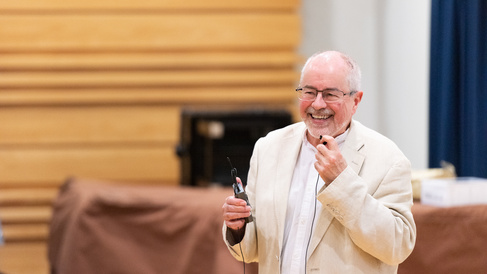
Today we hosted a farewell for Prof. Ian Cross in recognition of his long tenure as the Centre's director. A great number of former and current students, colleagues, and collaborators came together to share their experiences with Ian and to thank him for their times together. Transcripts from several of the speeches are given below:
Sarah Hawkins
I believe that Ian and I became University Lecturers in the same year – 1986. We met shortly after that, and like most Cambridge academics who enjoy each other’s company, we kept saying that we should get together more often, work together, and so on. Sometimes that almost happened, but we were both so busy that mostly it didn’t, largely, I suspect, because we were in different colleges and Faculties, which makes timetabling almost impossible.
But Ian ran these incredible seminars, embracing most of what I was interested in. And so I began to join in more and more, eventually moving formally to the Music Faculty in 2011. After that, collaboration was easier and I’m very pleased and proud that, together, we have managed to do some quite challenging research—some of it quite whacky—on what underpins human interaction. And to do that, we’ve melded insights and ideas from music, speech (phonetics) and a few other disciplines. I really wanted to do this work, and I couldn’t do it without Ian. So thank you, Ian, for enabling these last years to happen.
These are the qualities that, for me, define Ian both as a person and as the academic who made the CMS so excitingly vibrant. Generosity. Intellectual excitement. Enormous enthusiasm: for ideas, for food (and drink), for the natural world). Intellectual honesty. An encyclopaedic knowledge of the music and science literature, which meant that I didn’t have to remember as much as I thought I’d have to about who did what when. And… a sense of fun that was always ready to pop out even when we were mainly being serious.
Ian has the rare gift of being able to combine these things so that research is collaborative and fun, teaching is rigorous and open-minded in the best Cambridge tradition, students who are attracted to the CMS are interesting and creative, people are treated with compassion to the best of everyone’s ability. And the parties are great.
Ian, working in the CMS, and indeed in the whole of the Music Faculty, has been one of the two most fulfilling periods of my professional life. I do hope it was good for you too. I have every confidence that you’ll make sure that your retirement is fulfilling too!
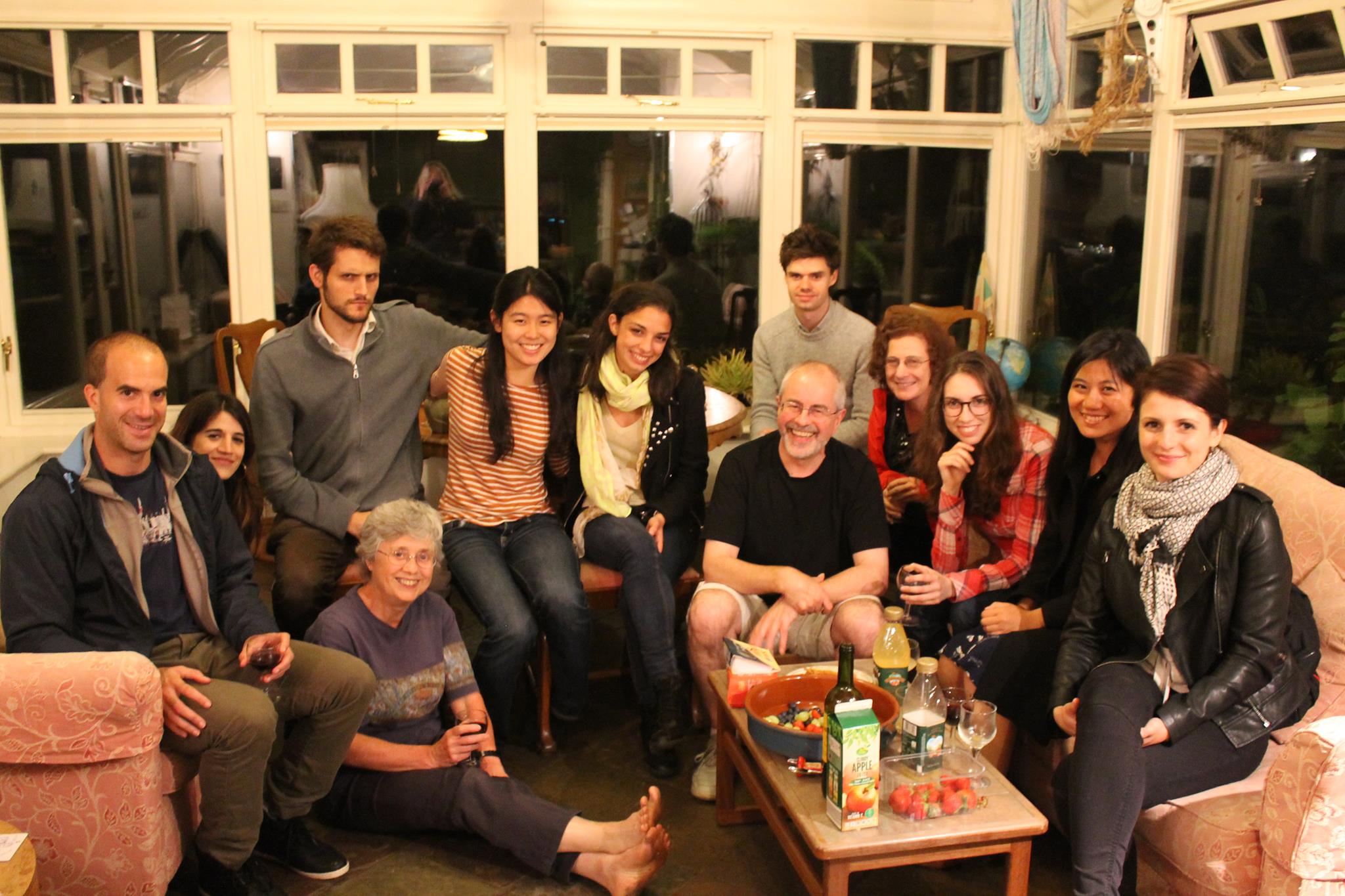
Sarah Knight
There’s so much I could say about the wonderful years I spent in the CMS as Ian’s PhD student, but when I was asked to contribute to today’s session I immediately remembered a postdoc interview that I went for a few years ago. I was lucky enough to get the job, and in the feedback from the interview the panel said that “they were impressed by my willingness to discuss subjects that weren’t my specialist topic”. When my friends hear this story they usually find it hilarious, because they think it means that I’m some sort of bluffer. But actually, I treasure this piece of feedback, because I think it’s a brilliant indication of the atmosphere of curiosity, enthusiasm and interdisciplinary exploration that Ian fostered in his students and in the CMS in general. I was encouraged to think about my research questions – about communication, interaction, the voice, and sound – from as many different angles as possible, and to engage with and support my colleagues’ research in the same way. New topics and unfamiliar approaches weren’t something to be viewed as difficult or intimidating; instead, I was given the confidence to see them as something to delve into, another potential tool in the toolkit.
These days I work almost exclusively on speech perception and other issues related to the human voice, such as how we learn to recognise people from their voices. These are topics that I love – but which I doubt I would ever have found my way to from a music degree were it not for Ian and the environment of interdisciplinary engagement and mutual support that he promoted, and which my colleagues and peers in the CMS did so much to bring to life. So I wanted to say a huge thank you to Ian for everything that he’s done for so many of us, and to wish him the very happiest of retirements.
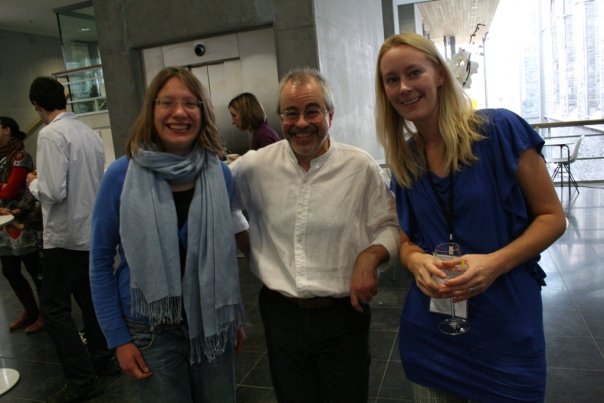
Lauren Fink
It’s only as I have recently started advising my own PhD students that I have come to more deeply appreciate the supervision structure Ian created. Every meeting with Ian started by going outside for a cigarette and a walk to CRASH for a coffee. In those minutes of cigarette smoking, walking, and breathing fresh air, it was possible to talk to Ian about whatever was on my mind. It was the personal part of the meeting. It was also the part that made Ian a human to me: he smoked cigarettes, he liked coffee. He was there to support me in whatever I might need outside of my master’s project. He made it possible to speak casually.
By the time we were back to Ian’s office, the academic part of the meeting started and, in this realm, Ian was equally supportive. During my masters, I had a vague idea that it might be interesting to study what the eyes were doing during music performance. Did eye movements become a rehearsed part of the motor sequence like other motor actions? Could we learn something about how people were processing musical structure by looking at their eye blinks? Ian non-judgmentally supported these interests, directing my reading, and ultimately encouraging me to build my own make-shift eye-tracker, using the CMS’s Go-Pro camera. This masters project formed the cornerstone of my PhD interests and current research. For example, I have found that the eyes can provide an implicit index of musical structure (event boundaries, beat frequency), and subjective states (like surprise, feeling in the groove, or feeling absorbed). I continue to study the complex relationships between specific acoustic features, and ocular and mental events.
The CMS being my first graduate school experience, I thought all graduate life must be similar; and all advisors equally supportive. It is only in leaving the CMS that I have truly realized what a uniquely supportive, non-judgmental, interdisciplinary environment Ian was able to create. I feel incredibly lucky to have worked with Ian at a time when I was transitioning from music conservatory to scientific research. It was necessary, but in retrospect rare, to receive the type of guidance Ian offers. I am grateful that he nurtured my interests in such a kind way, while also offering pragmatic advice – like, “wait at least ten years to publish” a paper that had earned me a high mark, but was a bit polemical, or, “don’t lose your connection to music studies when your do your PhD in neuroscience.”
I followed both pieces of advice. That paper that I will probably never publish was about citation practices in academia, and the (medieval, outdated) idea of authorship (authority) in the first place. One claim I was making was that ideas are never truly one’s own. They are the product of our previous interactions with others.
While Ian may not be an author on all of my papers, in essence he is.
He has shaped my thought, my approach to scientific questions, problem-solving, and writing. I am deeply honored to have the opportunity to publicly thank Ian today, though a thank you feels disproportional to the powerful growth that Ian, as a supervisor, cultivated.
It’s clear from the epic list of speakers today, what a legacy Ian leaves, and the global influence his ideas have had, and will continue to have, for generations.
I aspire to the kind of mentorship Ian provides – brilliant academic insights – and also coffee and walks outside.
Thank you, Ian. Congratulations on your retirement!!
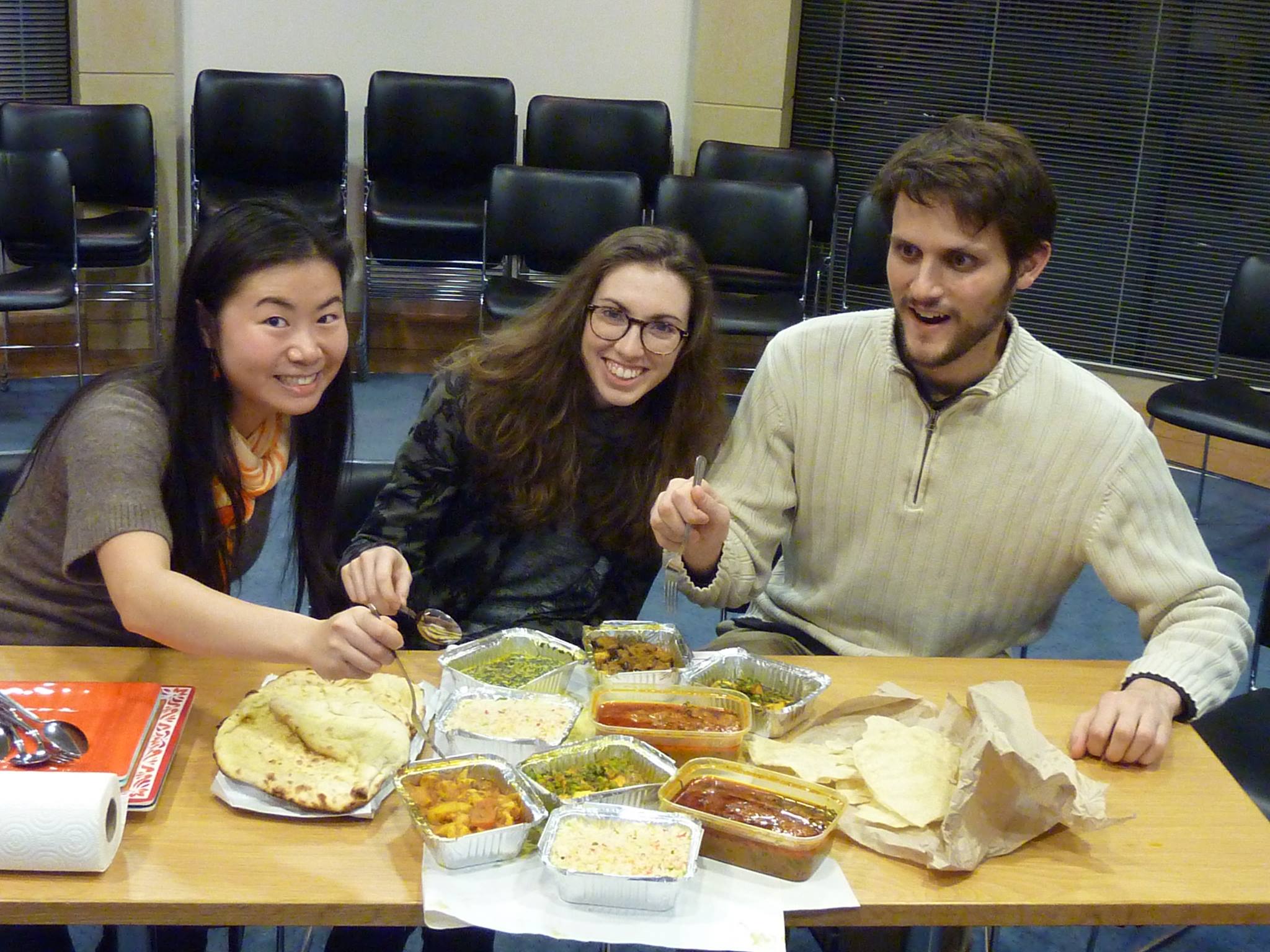
Justin London
Dear Friends and Colleagues
I am delighted to be at this event, if only virtually, celebrating Ian’s work and accomplishments as founder and director of the Centre for Music and Science at Cambridge, and I am honored to be the first speaker among a long(!) and distinguished list of fellow researchers and friends.
Ian is many things to me. First and foremost, a dear friend. But also a mentor, fellow researcher, co-author, advisor, confidant, AND guitar duet partner. So I thought it fitting to start my portion of the program with a little guitar music. Now, as Ian’s guitar partner, mostly I got to play the “second guitar” part—which was fine, as I was badly out of practice, and couldn’t (at the time) play many of the first guitar parts. So mostly I got to play parts that sounded like this:
[DEMONSTRATE]
But over the course of my year-long sabbatical with Ian, many transformations occurred. I recovered from three years of serving as department head. With Ian’s tutelage, I went from being an armchair music psychologist to an active experimenter. I met and mentored many of the students and postdocs at the CMS, whom I now count as colleagues. But most important for me, after a long hiatus, I picked up the guitar again, and I have never put it down since.
With the CMS, Ian created and nurtured a special place at Cambridge where all that, and more, could happen. And for all of that, Ian, thank you.
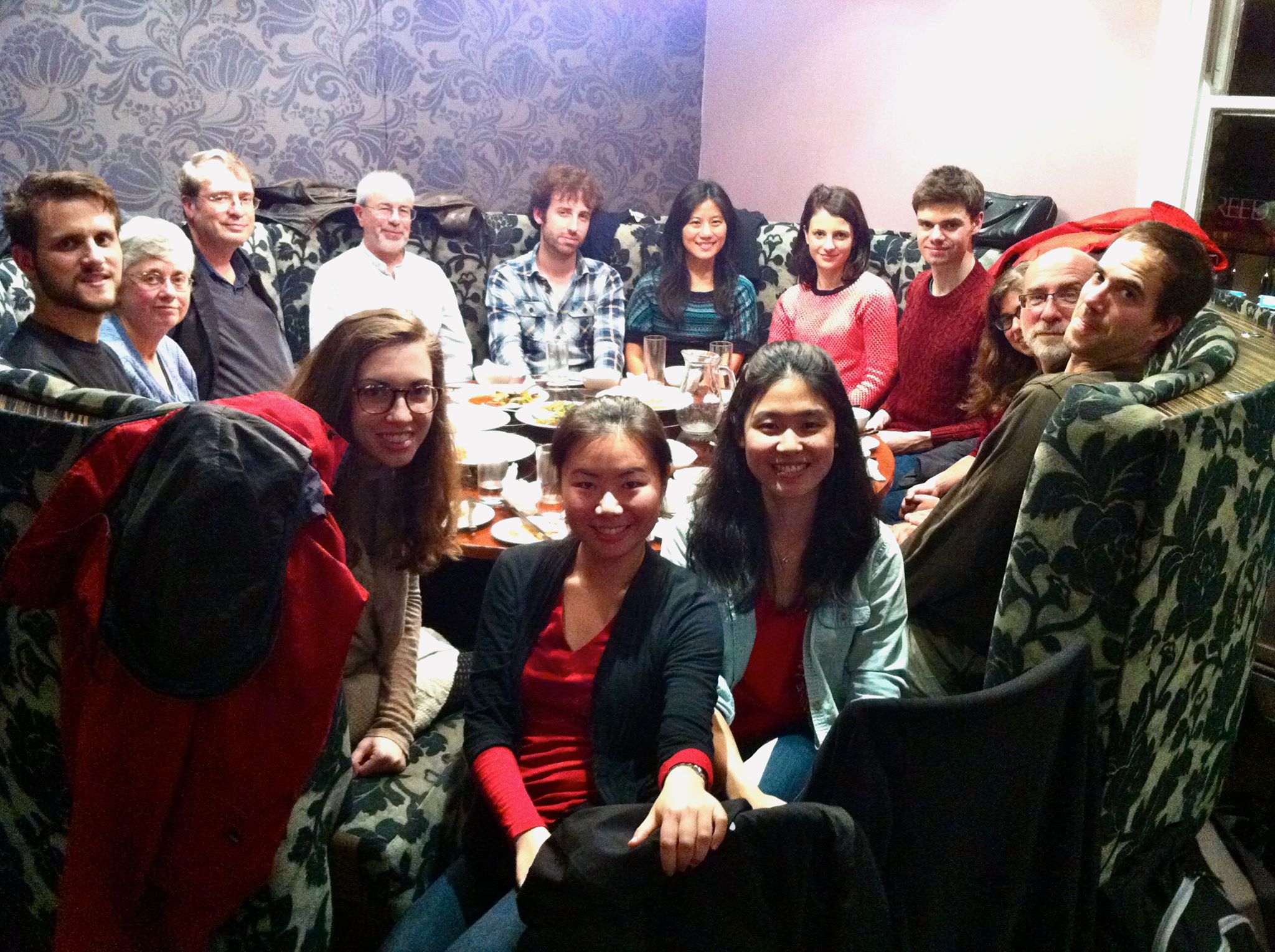
David Meredith
Hi Ian,
We first met, I believe, in 1986. I'd just completed the first year of the Natural Sciences Tripos and had decided to switch to music for the second and third years of my degree. Coming from natural sciences, I had a bit of an advantage on your brand new course on music perception, which partially made up for my lack of ability in some other subjects, like aural dictation, keyboard skills, or writing a fugue with no piano within reach.
I remember being starstruck at our first supervision when I turned up to find that my supervision partner was the already famous clarinettist, Emma Johnson - straight off the telly, as she had just recently won the UK Young Musician of the Year Award. Perhaps it was to boost my confidence that you got me to explain (or should I now say "mansplain") to her some of the finer nuances of the psychacoustics of pitch perception.
Since then, you've always been constant friend and ally who has helped me to get through several critical points in my life. I particular want to thank you for inviting me "back into the fold" when I returned from Switzerland in 1998. It was my participation in the seminar that you organised with Geraint's group that gave me my "big break" that finally allowed me to get paid for working on the problems I love with brilliant and like-minded people.
You've also always been there as a friend. I remember you even went house-hunting for Susanne and me, finding a little farm near Huntingdon where we lived for two years after we returned to England. You then came over to Denmark in 2005 to attend our wedding - I vividly remember you looking very fine in your kilt!
Since moving to Denmark, we've had less contact than I'd have liked, but I hope we can continue to work together on Music & Science (no, I haven't forgotten my promise of a special issue proposal...). I especially look forward to meeting up again in person when international travel becomes normal again.
So, thank you for your friendship and support over the many years that we've known each other. I wish you and Jane the very best over the exciting years to come! Have a great evening!
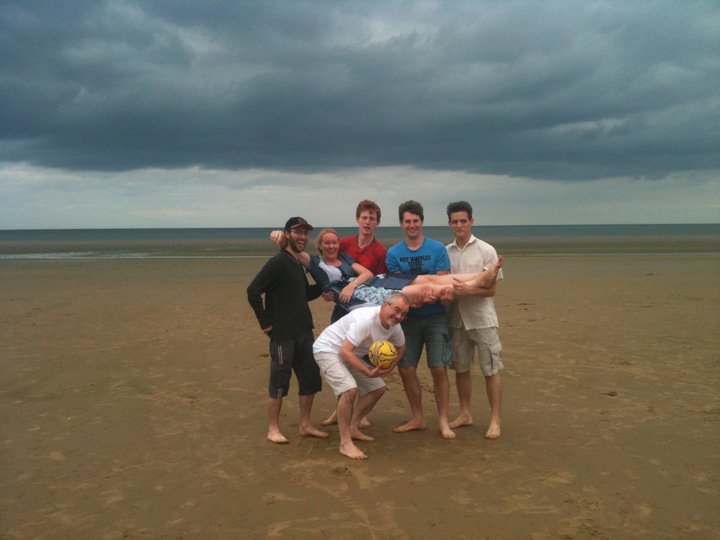
Elizabeth Margulis
I flew to Cambridge to spend the year, just me and a 4 and 5 year old, which would seem like an obvious recipe for trouble. Instead, I had a really transformative year, wrote my book On Repeat, learned how to cycle through cow pastures, and in general had my passion for scholarship rejuvenated. I am *certain* that neither that book, nor my sincere enjoyment of the year, would have happened without the incredibly welcoming and supportive environment Ian created at the CMS. To my credit, I identified this as special early on, and gave myself a sort of meta-task for the year: to figure out how to cultivate a graduate program and lab environment back home with as much genuine intellectual exchange and fun. I've spent the last few years trying to implement every lesson I learned from watching Ian's exceptional stewardship of CMS, but I'll admit that certain things, like Burns Night poetry and expert Scottish dancing, are tough to replicate. There are intrinsic challenges and unique benefits to establishing and guiding a thriving lab within the context of a Music Department, and without Ian's example, I'm confident that there would be no Music Cognition Lab here the Woolworth Building on Princeton's campus. Ian, you've made new career paths possible for so many of us. Thank you from me and from my own students, who are indirectly benefiting from the practices I learned at CMS.
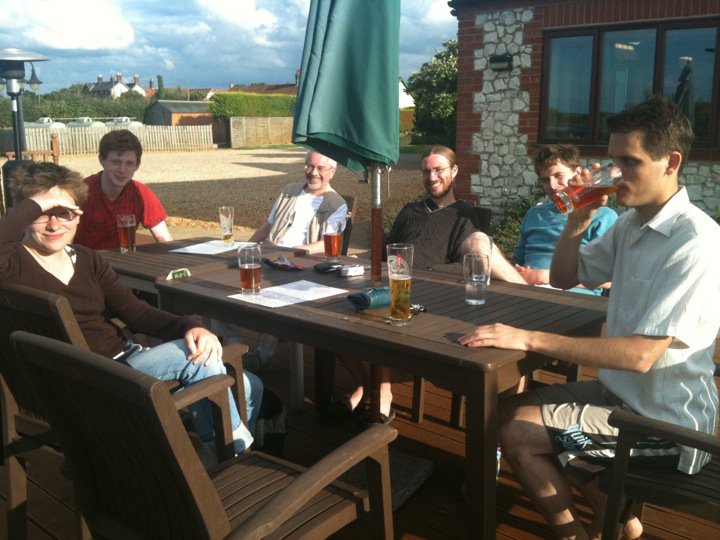
Elizabeth Tolbert
Hello, I am Elizabeth Tolbert, an ethnomusicologist who has just recently retired from the Peabody Institute of the Johns Hopkins University. Welcome to the club, Ian!
My first contact with Ian was not especially promising. It started as a favor to Carol Krumhansl, then president of the Society for Music Perception and Cognition, who suggested that I contact him to put together a panel on Music and Evolution for the upcoming SMPC meeting. I wondered who on earth could also be thinking about this weird topic, if he had anything interesting to say about it, and whether I could tolerate a person whom I imagined to be a stuffy Cambridge don. I wrote a very formal note asking him if he wanted to be on the panel, and received a very formal note back agreeing to participate.
With some trepidation on my part, we met in the flesh at the SMPC meeting in Evanston in 1999. Surprise! Ian was youngish, well, about my age anyway, energetic, funny, brilliant, irreverent, a bird watcher (an activity which he insisted on pursuing during the meeting), an intrepid walker (yeah, someone to walk with!), a fountain of esoteric knowledge-- all and all, just great! Not stuffy at all, a bit intellectually off-beat but in a very relatable way, and just brimming with ideas. We laughed and had feverish discussions not only about the evolution of music but about our respective wild upbringings, although his in Scotland certainly seemed more exotic to me than mine in Colorado. But perhaps even more surprising, his musings on music and evolution made more sense to me than anything I had read to date. Somehow, we seemed to be on the same wave-length, despite our divergent disciplinary backgrounds (mine in ethnomusicology, his in music cognition and music theory). He mentioned off-handedly that I could bring my family to Cambridge sometime to spend a sabbatical there- and so began a series of pilgrimages to the Centre for Music and Science that have lasted for more than 20 years. I cannot thank you enough, Ian, for those wonderful visits.
Of course, it goes without saying that we all know Ian as one of the most renowned music scholars in the world, one, who with rare insight and creativity, has come up with an utterly original perspective on music as ethical, socially enactive, communicative, and, my favorite, as possessing “floating intentionality”. Due to Ian and his collaborators, the terms of the discussion have irrevocably changed, and indeed, are now taken for granted.
Ian, many thanks for your friendship and for our work together, it has been a highlight of my academic life. And although I know you did not do it just for me, many thanks for founding the Centre for Music and Science, and for creating an intellectual home for me and countless others.
Congratulations, Ian, love you!
Liz
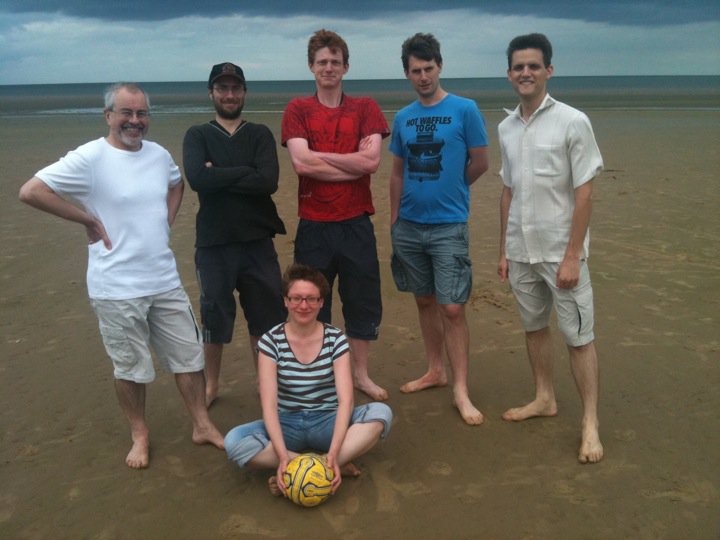
Fernando Bravo
I wish to thank Ian for his kindness and openness, which made working with him as a PhD student such an interesting adventure.
Geraint Wiggins
I believe I first met Ian Cross in 1997 at the Uppsala ESCOM conference. That conference, for me, was a turning point in my career, because, previously, I had been completely ignorant of the extraordinary breadth, depth and quality of the research field of music psychology. Hearing Ian give his conference presentation in that amazing Radio voice - he’s still the only person I know who can literally read out a conference paper and make it sound completely spontaneous - was one of many career-changing experiences for me that week. What was even more amazing when meeting him in person was his charming, open and gentle nature, which seemed then at odds with the profound speaker on stage.
Little did I know, then, that Ian’s contribution went way deeper than I imagined, right back to the inception of music psychology as a distinct discipline in the mid-1980s, with his involvement with ESCOM and later with the institution that we are now also indirectly celebrating - the Centre for Music and Science. I think it’s really important that Ian did not file his research centre under “psychology”. Even though his contribution to that field has been highly significant, his primary instinct, like mine, is the scientific study of music. I agree with Ian that Music Cognition needs to be right in there, at the core. But I also agree with him that there is so much more to be understood: physics, perception, cognition, social context and evolutionary development. Music and Science it has to be. And the establishment of that Centre in the Faculty of Music in Cambridge - not then renowned for its assertive modernity - was the beginning of a sea change in the traditional universities from which we are all now reaping the benefits. Ian has played, and is still playing, a radically modernising role in the academic study of music, the consequences of which are only beginning to be felt.
The title “emeritus” was rarely awarded to a more deserving candidate: he has certainly earned his freedom. But I am equally certain that such a determined intellectual will never really retire, and that there is lots more to come.
Jin Hyun Kim
In a scientific journey navigating complex research topics, we come to learn from and collab-orate with scholars from diverse disciplines and fields. These collaborations develop us as scholars who feel comfortable in transdisciplinary environments. Moreover, we grow more confident changing preconceived scientific opinions in our intradisciplinary contexts. Ian Cross is a genuinely transdisciplinary scholar. He has developed novel insights into phenom-ena and behaviors which are either described with emic expressions synonymous with “mu-sic” or understood from a musicological-etic perspective as music. Instead of conceiving of music as a purely complex auditory pattern, Ian suggests viewing it as a medium for complex social interaction. He has continuously refined this thesis, a process I have been fortunate enough to follow since I studied Systematic Musicology in Germany. I vividly remember how I became inspired by three of Ian's papers “Musicality and the human capacity for culture” (2008), “The evolutionary nature of musical meaning” (2009), “Music as a communicative medium” (2009; co-authored by Ghofur Eliot Woodruff). Since then, Ian has been a model for me in his engagement with topics related to basic music research and transdisciplinary re-search.
Our concerted exchanges began in 2018, when I invited Ian to give a keynote lecture at the conference “Musical ‘Meaning’, Social Interaction, and Teleofunctionalism,” at the Humboldt University of Berlin. Subsequently, I visited the Centre for Music and Science for several months; during this time, we had regular weekly discussions—with Elizabeth Tolbert, a visit-ing fellow—on the biocultural foundations of music and musical meaning, each of which was enormously thought-provoking. I also grew to look forward to every more casual conversation I had with Ian, particularly at Wolfson College during lunch. These conversations showed me how wide-ranging Ian’s interests are and how he critically reflects on social problems. Moreover, I came to know Ian as a warm-hearted person who makes his colleagues and students happy in their work and studies with him. In this way, Ian has become my role model as a university professor—a researcher and a teacher. I am also excited to continue our in-tense exchanges this coming winter, as we are planning to work together on a book. Alt-hough I have missed meeting with Ian in person—our recent conversations have been on a video conference system—it remains a great pleasure to collaborate with Ian, who is a con-stant source of both scientific inspiration and personal motivation. I have seldom known such a balanced scholar. It is certain that Ian's transdisciplinary mind and gracious, generous per-sonality will continue to positively influence his colleagues and students from diverse disci-plines for long after his retirement.
Neta Spiro
We all know about Ian's pioneering work in music and science; about the variety of topics in which he has taken an interest, and the range of areas in music and science in which he has supervised; and we all know about the numerous academic lives he has touched and influenced. But for now, I will add only two words: "yes, and".
During the almost 20 years that I have known Ian, one thing that has struck me is his open approach. When I or others propose ideas, he so often responds positively — a "yes" — and follows this with thoughts of how to develop them — an "and". Whether that's an idea for a PhD or a paper; an idea for a grant or a conference; or the idea of wearing a toga and explaining how sound works to a hall full of school children.
Noah Roy Fram
Ian wasn't just teaching me how to do research. He was teaching me how to be a scholar, and that scholarship isn't just about papers and results and what fame a music professor can achieve. It's about all these other things, too, about being generous with your time, being warm and welcoming, finding ways to bring yourself into what you do. It's about mentoring the next generation of scholars, whether they're coming from a neuroscience lab or backstage in a theatre. And most of all, it's about being incurably curious, about finding joy in the never ending search for knowledge, and holding on to whatever else brings you joy. I would not be in this field at all if it were not for Ian saying yes when I applied to Cambridge out of teaching high school math, and I cannot express how grateful I am for that chance. Ian taught me that it is actually possible to be a happy professor.
